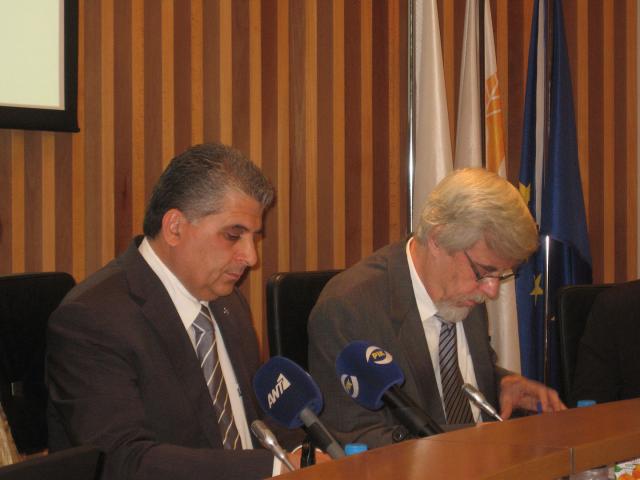Geneva, 5 October 2012. The CERN1 Director-General, Rolf Heuer, and the Minister of Education and Culture of the Republic of Cyprus, George Demosthenous, today signed an agreement under which the Republic of Cyprus will become an Associate Member State in the pre-stage to Membership. The agreement will have to be ratified by the Parliament of Cyprus before coming into force.
"We are very happy to welcome the Republic of Cyprus as a new Associate Member State in the pre-stage to Membership," declared CERN's Director-General, Rolf Heuer. "Cypriot physicists have made up a small but very active community at CERN for many years. This new status will enable the country to derive greater benefit from the opportunities offered by CERN, whether through participation in scientific programmes, through industrial development or through education and training."
"It is with great pleasure that I have signed, on behalf of the Government of the Republic of Cyprus, our country’s admission to CERN as an Associate Member State in the pre-stage to Membership. We consider this agreement to be the cornerstone of our efforts to support and enhance the Cypriot scientific and research community and we are certain that as an Associate Member our contribution to CERN will not only continue but it will undoubtedly be strengthened", said George Demosthenous, Minister of Education and Culture of the Republic of Cyprus.
In the early 1990s, physicists from the Republic of Cyprus took part in the L3 experiment at CERN's Large Electron Positron (LEP) collider before joining the CMS collaboration, one of the experiments at the Large Hadron Collider (LHC), in 1995. A Memorandum of Understanding was signed between the University of Cyprus and CMS in 1999 under which Cypriot scientists have notably contributed to the development of the solenoid magnet and of the CMS electromagnetic calorimeter. They are also involved in the physics analyses of the CMS experiment, including in certain searches for the Higgs boson and beauty quarks.
“This Associate Membership shows our young generation that high-calibre research, innovation and education is the right way to stimulate development, pointing to a bright future for Europe. CERN is a living example of European integration and world collaborative spirit”, added Panos Razis, Professor and Leader of the High Energy Physics team at the University of Cyprus. “The dream we set 20 years ago when we founded the first university of the country now becomes a reality.”
The Republic of Cyprus is the third country to accede to the status of Associate Member State in the pre-stage to Membership after Israel in 2011 and Serbia earlier in 2012.
Contact
Emmanuel Tsesmelis, CERN Directorate Office:
Emmanuel.Tsesmelis@cern.ch
+41 (0)76 487 40 57
1. CERN, the European Organization for Nuclear Research, is the world's leading laboratory for particle physics. It has its headquarters in Geneva. At present, its Member States are: Austria, Belgium, Bulgaria, Czech Republic, Denmark, Finland, France, Germany, Greece, Hungary, Italy, Netherlands, Norway, Poland, Portugal, Slovak Republic, Spain, Sweden, Switzerland and the United Kingdom. Romania has the status of Candidate for Accession. Israel and Serbia are Associate Member States in the pre-stage to Membership. India, Japan, the Russian Federation, the United States of America, Turkey, the European Commission and UNESCO have Observer status.

